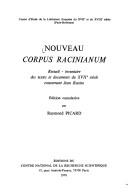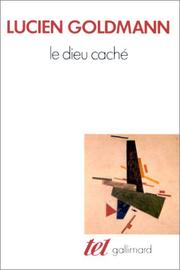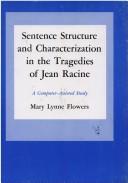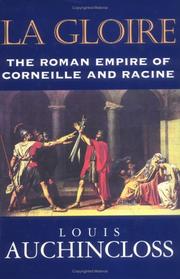| Listing 1 - 10 of 32 | << page >> |
Sort by
|
Book
ISBN: 0691652805 1400876079 9781400876075 0691061068 9780691061061 0691626561 9780691626567 Year: 2015 Publisher: Princeton, NJ
Abstract | Keywords | Export | Availability | Bookmark
 Loading...
Loading...Choose an application
- Reference Manager
- EndNote
- RefWorks (Direct export to RefWorks)
Translated into English rhyming verse, with introductions, by Lacy Lockert, the four plays included in this volume are Berenice, Bajazet, Mithridate, and Iphigenie. They are significant for their inherent excellence, and for what they reveal about the development of a great dramatist.Originally published in 1958.The Princeton Legacy Library uses the latest print-on-demand technology to again make available previously out-of-print books from the distinguished backlist of Princeton University Press. These editions preserve the original texts of these important books while presenting them in durable paperback and hardcover editions. The goal of the Princeton Legacy Library is to vastly increase access to the rich scholarly heritage found in the thousands of books published by Princeton University Press since its founding in 1905.
LITERARY CRITICISM / European / French. --- Racine, Jean, --- Racine, Jean-Baptiste --- Racine, Jean --- La-hsin, --- Laxin, --- Rassin, --- Racine, Jean Baptiste, --- Racine, --- Rasin, Zhan, --- Rasin, Chang, --- Rasin, --- Rasin, Z'an, --- Rashīnu, Jan, --- ראסין, ז׳אן --- רסין, ז׳ן --- 拉辛, --- ラシーヌジャン,
Book
ISBN: 2130358187 9782130358183 Year: 1978 Volume: 1753 Publisher: Paris PUF
Abstract | Keywords | Export | Availability | Bookmark
 Loading...
Loading...Choose an application
- Reference Manager
- EndNote
- RefWorks (Direct export to RefWorks)
Racine, Jean --- Racine, Jean, --- Tragedy --- Criticism and interpretation --- 840 RACINE, JEAN --- Désherbage --- Deselectie --- Tragedy. --- Criticism and interpretation. --- Drama --- La-hsin, --- Laxin, --- Rassin, --- Racine, Jean Baptiste, --- Racine, --- Rasin, Zhan, --- Rasin, Chang, --- Rasin, --- Rasin, Z'an, --- Rashīnu, Jan, --- ראסין, ז׳אן --- רסין, ז׳ן --- 拉辛, --- ラシーヌジャン, --- Racine, Jean-Baptiste --- Racine, Jean, - 1639-1699 - Criticism and interpretation --- Racine, Jean, - 1639-1699

ISBN: 2222018498 9782222018490 Year: 1976 Publisher: Paris Centre national de la recherche scientifique
Abstract | Keywords | Export | Availability | Bookmark
 Loading...
Loading...Choose an application
- Reference Manager
- EndNote
- RefWorks (Direct export to RefWorks)
French literature --- Racine, Jean --- Dramatists, French --- Allusions --- -French dramatists --- Biography --- -Allusions --- Biography. --- Racine, Jean, --- Allusions. --- -Biography --- La-hsin, --- Laxin, --- Rassin, --- Racine, Jean Baptiste, --- Racine, --- Rasin, Zhan, --- Rasin, Chang, --- Rasin, --- Rasin, Z'an, --- Rashīnu, Jan, --- ראסין, ז׳אן --- רסין, ז׳ן --- 拉辛, --- ラシーヌジャン, --- Racine, Jean-Baptiste --- Dramatists, French - 17th century - Biography --- Racine, Jean - Allusions --- RACINE (JEAN), POETE DRAMATIQUE FRANCAIS, 1639-1699 --- CORPUS RACINIANUM
Book
ISBN: 3770514815 9783770514816 Year: 1977 Volume: 34 Publisher: München Fink
Abstract | Keywords | Export | Availability | Bookmark
 Loading...
Loading...Choose an application
- Reference Manager
- EndNote
- RefWorks (Direct export to RefWorks)
Racine, Jean --- Tragedy --- Racine, Jean, --- Criticism and interpretation --- Drama --- -Criticism and interpretation --- La-hsin, --- Laxin, --- Rassin, --- Racine, Jean Baptiste, --- Racine, --- Rasin, Zhan, --- Rasin, Chang, --- Rasin, --- Rasin, Z'an, --- Rashīnu, Jan, --- ראסין, ז׳אן --- רסין, ז׳ן --- 拉辛, --- ラシーヌジャン, --- Criticism and interpretation. --- Racine, Jean-Baptiste --- Racine, Jean, - 1639-1699 - Criticism and interpretation --- Racine, Jean, - 1639-1699
Book
ISBN: 063117950X 9780631179504 Year: 1978 Publisher: Oxford Blackwell
Abstract | Keywords | Export | Availability | Bookmark
 Loading...
Loading...Choose an application
- Reference Manager
- EndNote
- RefWorks (Direct export to RefWorks)
French drama (Tragedy) --- French drama --- History and criticism --- Racine, Jean, --- La-hsin, --- Laxin, --- Rassin, --- Racine, Jean Baptiste, --- Racine, --- Rasin, Zhan, --- Rasin, Chang, --- Rasin, --- Rasin, Z'an, --- Rashīnu, Jan, --- ראסין, ז׳אן --- רסין, ז׳ן --- 拉辛, --- ラシーヌジャン, --- Racine, Jean --- Criticism and interpretation. --- Racine, Jean-Baptiste

ISBN: 2070295508 9782070295500 Year: 1976 Volume: 11 Publisher: Paris : Gallimard,
Abstract | Keywords | Export | Availability | Bookmark
 Loading...
Loading...Choose an application
- Reference Manager
- EndNote
- RefWorks (Direct export to RefWorks)
God in literature --- Dieu dans la littérature --- Pascal, Blaise, --- Racine, Jean, --- 82 --- CDL --- Racine, Jean-Baptiste --- Racine, Jean --- La-hsin, --- Laxin, --- Rassin, --- Racine, Jean Baptiste, --- Racine, --- Rasin, Zhan, --- Rasin, Chang, --- Rasin, --- Rasin, Z'an, --- Rashīnu, Jan, --- ראסין, ז׳אן --- רסין, ז׳ן --- 拉辛, --- ラシーヌジャン, --- Tragic, The. --- Tragique (philosophie) --- Critique et interprétation.

ISBN: 0838620566 Year: 1979 Publisher: Rutherford Fairleigh Dickinson university press
Abstract | Keywords | Export | Availability | Bookmark
 Loading...
Loading...Choose an application
- Reference Manager
- EndNote
- RefWorks (Direct export to RefWorks)
French language --- Tragedy --- Drama --- Langue d'oïl --- Romance languages --- Sentences --- Racine, Jean, --- Racine, Jean-Baptiste --- Racine, Jean --- Literary style. --- French literature --- La-hsin, --- Laxin, --- Rassin, --- Racine, Jean Baptiste, --- Racine, --- Rasin, Zhan, --- Rasin, Chang, --- Rasin, --- Rasin, Z'an, --- Rashīnu, Jan, --- ראסין, ז׳אן --- רסין, ז׳ן --- 拉辛, --- ラシーヌジャン,

ISBN: 0585334072 9780585334073 1570031223 Year: 1996 Publisher: Columbia, S.C. University of South Carolina Press
Abstract | Keywords | Export | Availability | Bookmark
 Loading...
Loading...Choose an application
- Reference Manager
- EndNote
- RefWorks (Direct export to RefWorks)
"In a charming collection of elegant essays, one of the twentieth century's leading men of letters turns his vast knowledge and worldly authority to the texts of two seventeenth-century French dramatists. Louis Auchincloss considers sixteen plays by Pierre Corneille (1606-84) and his younger theatrical rival, Jean Racine (1639-99). Musing on the ideas that informed the court of the Sun King and on what classical allusions meant to them, Auchincloss offers thoughtful readings, new translations, and a wealth of shrewd observations about French classic tragedy, passion, self-sacrifice, self-aggrandizement, and civic and military glory." "Auchincloss lets the grand voices of Corneille's and Racine's heroes and heroines speak, while calling attention to details and discoveries that illumine aspects of both seventeenth-century and twentieth-century culture. He specifically considers the theme of gloire - the lofty destiny or mission that the hero (and more rarely the heroine) has set for himself and for which he would willingly sacrifice the most passionate romance, closest friendship, or dearest family ties. While gloire is more commonly associated with Corneille than with Racine, Auchincloss demonstrates that these French masters were capable of swapping predilections when it came to the Roman plays."--Jacket.
Romance Literatures --- Languages & Literatures --- French Literature --- Corneille, Pierre, --- Racine, Jean, --- Racine, Jean-Baptiste --- Racine, Jean --- Corneille, Pierre --- Criticism and interpretation. --- Rome --- In literature. --- La-hsin, --- Laxin, --- Rassin, --- Racine, Jean Baptiste, --- Racine, --- Rasin, Zhan, --- Rasin, Chang, --- Rasin, --- Rasin, Z'an, --- Rashīnu, Jan, --- ראסין, ז׳אן --- רסין, ז׳ן --- 拉辛, --- ラシーヌジャン,
Book
ISBN: 0271061669 0271052287 0271059125 9780271061665 9780271037301 027103730X 9780271037448 027103744X 9780271048598 027104859X 9780271052489 0271052481 9780271064062 Year: 2021 Publisher: University Park, PA
Abstract | Keywords | Export | Availability | Bookmark
 Loading...
Loading...Choose an application
- Reference Manager
- EndNote
- RefWorks (Direct export to RefWorks)
This is the third volume of a projected translation into English of all twelve of Jean Racine’s plays—only the third time such a project has been undertaken. For this new translation, Geoffrey Alan Argent has rendered these plays in the verse form that Racine might well have used had he been English: namely, the “heroic” couplet. Argent has exploited the couplet’s compressed power and flexibility to produce a work of English literature, a verse drama as gripping in English as Racine’s is in French. Complementing the translation are the illuminating Discussion, intended as much to provoke discussion as to provide it, and the extensive Notes and Commentary, which offer their own fresh and thought-provoking insights.In Iphigenia, his ninth play, Racine returns to Greek myth for the first time since Andromache. To Euripides’s version of the tale he adds a love interest between Iphigenia and Achilles. And dissatisfied with the earlier resolutions of the Iphigenia myth (her actual death or her eleventh-hour rescue by a dea ex machina), Racine creates a wholly original character, Eriphyle, who, in addition to providing an intriguing new denouement, serves the dual dramatic purpose of triangulating the love interest and galvanizing the wholesome “family values” of this play by a jolt of supercharged passion.
Racine, Jean, --- Racine, Jean-Baptiste --- Racine, Jean --- Criticism and interpretation. --- LITERARY COLLECTIONS / European / General. --- La-hsin, --- Laxin, --- Rassin, --- Racine, Jean Baptiste, --- Racine, --- Rasin, Zhan, --- Rasin, Chang, --- Rasin, --- Rasin, Z'an, --- Rashīnu, Jan, --- ראסין, ז׳אן --- רסין, ז׳ן --- 拉辛, --- ラシーヌジャン,
Book
ISBN: 0271061677 0271055529 027105400X 9780271055527 9780271061672 9780271052489 0271052481 Year: 2021 Publisher: University Park, PA
Abstract | Keywords | Export | Availability | Bookmark
 Loading...
Loading...Choose an application
- Reference Manager
- EndNote
- RefWorks (Direct export to RefWorks)
As Voltaire famously opined, Athaliah, Racine’s last play, is “perhaps the greatest masterwork of the human spirit.” Its formidable antagonists, Athaliah, queen of Judah, and Jehoiada, high priest of the temple of Jerusalem, are engaged in a deadly struggle for dominion: she, fiercely determined to maintain her throne and exterminate the detested race of David; he, no less fiercely determined to overthrow this heathen queen and enthrone the orphan Joash, the scion of the house of David, whom Athaliah believes she slew as an infant ten years earlier. This boy represents the sole hope for the survival of the royal race from which is to spring the Christ. But in this play, even God is more about hate and retribution than about love and mercy.This is the fourth volume of a projected translation into English of all twelve of Jean Racine’s plays—only the third time such a project has been undertaken. For this new translation, Geoffrey Alan Argent has rendered these plays in the verse form that Racine might well have used had he been English: namely, the “heroic” couplet. Argent has exploited the couplet’s compressed power and flexibility to produce a work of English literature, a verse drama as gripping in English as Racine’s is in French. Complementing the translation are the illuminating Discussion, intended as much to provoke discussion as to provide it, and the extensive Notes and Commentary, which offer their own fresh and thought-provoking insights.
Racine, Jean, --- Racine, Jean-Baptiste --- Racine, Jean --- Criticism and interpretation. --- LITERARY COLLECTIONS / European / General. --- La-hsin, --- Laxin, --- Rassin, --- Racine, Jean Baptiste, --- Racine, --- Rasin, Zhan, --- Rasin, Chang, --- Rasin, --- Rasin, Z'an, --- Rashīnu, Jan, --- ראסין, ז׳אן --- רסין, ז׳ן --- 拉辛, --- ラシーヌジャン,
| Listing 1 - 10 of 32 | << page >> |
Sort by
|

 Search
Search Feedback
Feedback About UniCat
About UniCat  Help
Help News
News